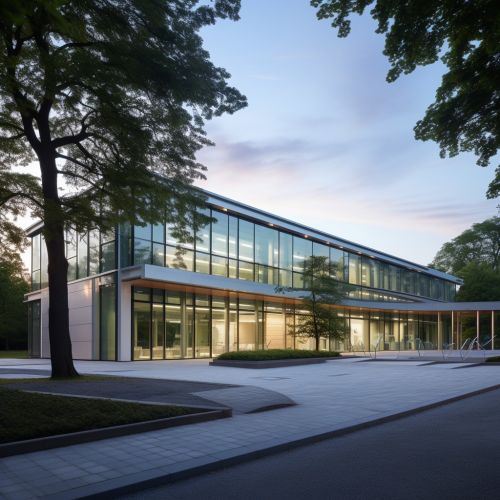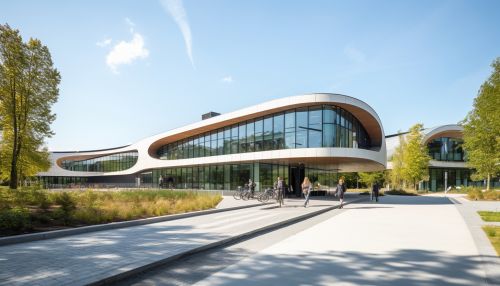Max Planck Institute for Solid State Research
Overview
The Max Planck Institute for Solid State Research (MPI-FKF) is a research institution located in Stuttgart, Germany. It is one of the 83 institutes that make up the Max Planck Society, a non-profit association dedicated to fundamental research in the natural and social sciences. The MPI-FKF focuses on the investigation of physical and chemical properties of solids and interfaces, with an emphasis on the development of new materials and technologies.


History
The MPI-FKF was founded in 1969 as part of the expansion of the Max Planck Society in the field of solid state physics. The institute's initial research focus was on the theoretical and experimental study of the electronic structure of solids. Over the years, the institute has broadened its research scope to include a wide range of topics in condensed matter physics and materials science.
Research Areas
The MPI-FKF is divided into several research departments, each focusing on a specific area of solid state research. These departments include:
Quantum Many-Body Systems
The Department of Quantum Many-Body Systems investigates the collective behavior of interacting particles in quantum systems. The research focuses on understanding the emergence of complex phenomena such as superconductivity and magnetism from the underlying quantum mechanical interactions.
Solid State Spectroscopy
The Department of Solid State Spectroscopy studies the interaction of light with solids to gain insights into their electronic and vibrational properties. The department uses a variety of spectroscopic techniques, including Raman spectroscopy, infrared spectroscopy, and photoemission spectroscopy.
Microstructure Physics and Alloy Design
The Department of Microstructure Physics and Alloy Design focuses on the development of new materials with tailored properties. The research involves the study of phase transformations, microstructural evolution, and mechanical properties of alloys.
Interface Chemistry and Surface Engineering
The Department of Interface Chemistry and Surface Engineering investigates the chemical and physical properties of interfaces in solids. The research aims to understand the role of interfaces in determining the properties of materials and to develop methods for the controlled modification of interfaces.
Facilities
The MPI-FKF is equipped with state-of-the-art facilities for the synthesis and characterization of materials. These include cleanroom facilities for the fabrication of nanostructures, high-resolution electron microscopes for the investigation of microstructures, and advanced spectroscopic instruments for the study of electronic and vibrational properties of materials.
Collaborations and Partnerships
The MPI-FKF collaborates with numerous other research institutions and universities worldwide. These collaborations often involve joint research projects, exchange of researchers, and shared use of research facilities. The institute is also part of several research networks and consortia, including the European Research Council and the German Research Foundation.
Impact
The research conducted at the MPI-FKF has led to numerous scientific publications and patents. The institute's research has also contributed to the development of new materials and technologies with potential applications in various fields, including electronics, energy storage, and catalysis.
